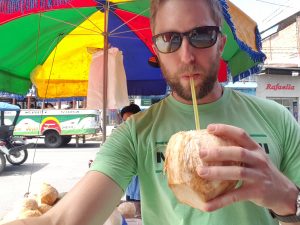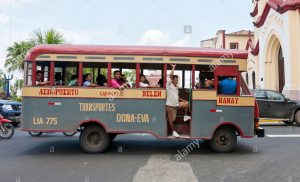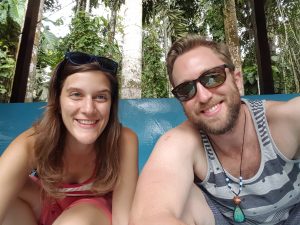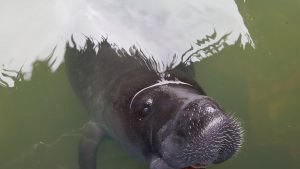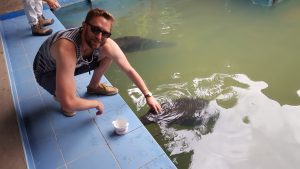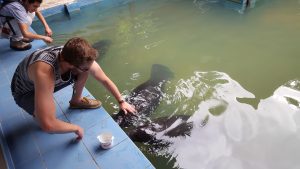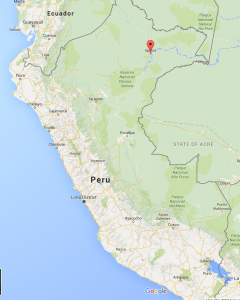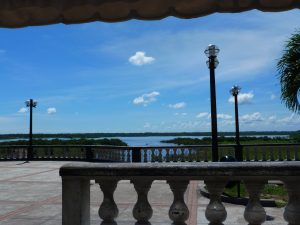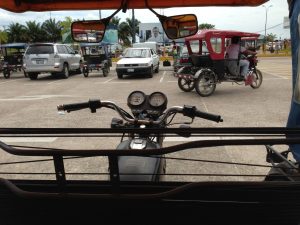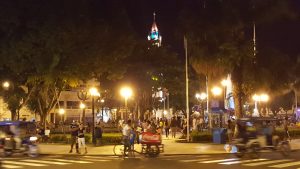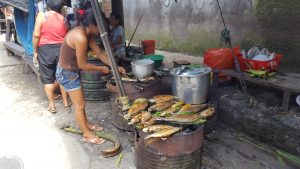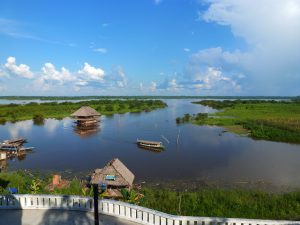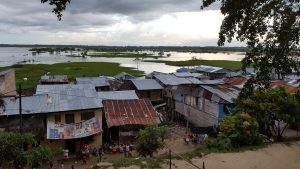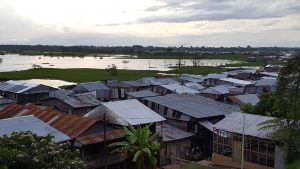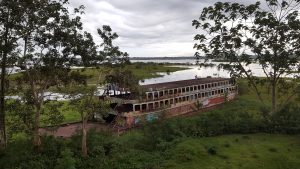I moved my stuff out of Hotel La Casona and headed to the Green Track Hostel. A Canadian girl, Megan, I had met in Iquitos was staying there and told me it was somewhat of a party hostel, good for meeting others, and cheap. I took her advice and checked into a coed dormitory room containing three bunk beds for 25 soles (S./25) per night, about $7.50. Much better than the S./80 I was paying at the hotel. There was only two others staying in the room at that point, so I was fortunate to get a bottom bunk and the room was relatively quiet. There was a kitchen at the hostel, which is important, so you don’t have to eat all your meals at a restaurant which gets expensive quickly. It’s also important for diet considerations, so you can better control what goes into your body. Other than that, the accommodations were pretty meager. The shared bathroom were not the most functional or pleasant I’ve seen. But it would do.
The staff at the hostel were all volunteers. They were each travelers who were low on cash and agreed to work at the hostel for free lodging. There was Asha from Australia, Eva from Switzerland, and Dorentha from Malaysia. They were cool and helpful in giving me directions and info about the city, and we would become friends over the course of the week.
I spent most of the first day walking around the city. Trying to get a grasp of the geography and scouting out places for running errands. Later I came back, did some writing, made dinner, and watched the Karate Kid in Spanish before retiring.
The next day I woke up and made some coffee and spent the next couple hours having a leisurely breakfast while writing posts for this blog. I met a girl, Riley, from Oregon staying in the hostel and we hit it off. She had been in Iquitos for a more than a week already.
We spent the afternoon walking around, her showing me the gems she had discovered in the city. One of which was an orange, dairy-free ice cream or ‘cremolada.’ At first we thought it was sweet potato flavored, but it turned out to be lucuma (not too far off). Wow, this stuff was amazing—so creamy and delicious; sweet, but not too sweet. I indulged in a cup of the cremolada lucuma for S./3 almost every day while in Iquitos.

Another thing Riley showed me were coconuts sold by street vendors. You get an entire coconut, freezing cold for S./3, less than a dollar. Drink the icy cold coconut water laden with electrolytes to help with the oppressive jungle heat, then take the thing home and scoop out the flesh for a delicious, fresh, high-fat (good fat) treat. I added the coconut flesh to a few smoothies and it was amazing.
While I’m somewhat on the topic, here is another of the ‘little things’ that make life on the road pleasurable. I’m not sure if I ever had starfruit before being in Iquitos. It’s an extremely tart, citrus fruit. I have done no research to back this up, but when I ate these I felt like they were doing my body an incredible service. Particularly, I felt like it helped me detox after drinking. I ate these every day in Iquitos.

We went to the supermarket, bought a big filet of donzella, an Amazonian fish common in restaurants in Iquitos, and some veggies, went back to the hostel, and cooked dinner together. She cooked the fish and potatoes and I cooked the veggies. Everything turned out really good and we had a nice little dinner together. We hung out and had a beer after dinner. Unfortunately, she was taking the tugboat to Leticia, Colombia at 5am the next morning. She had to get to bed, so we said goodbye and exchanged contact info. I did some reading then followed suit and hit the hay.
I had expressed interest to the hostel staff in wanting to go to the animal sanctuary and manatee rescue center near Iquitos, which they had recommended to me. I told them I was looking for a buddy to go with. When I woke up the next morning, Dorentha told me there was a new girl staying at the hostel who also wanted to go. So, I met Indra, a lovely girl from Belgium whom had just finished med school and was taking a several months long vacation before beginning residency. We decided to go in the early afternoon.
Getting to the sanctuary was quite the experience for a South American travel greenhorn like myself. It required taking a bus 45 minutes outside the city. A bus in Peru is not like a bus in the US. There are no ‘stops.’ Buses go from one destination to another, usually nearby cities, and then back again. You flag down a bus that is going in the direction you want to go and they’ll stop for you. Then, when approaching your destination, you let the driver or doorman know and they’ll pull over. This isn’t the easiest thing for non-natives or those not fluent in Spanish.
Indra and I stood on the corner and flagged down a bus. When they stopped we tried to ask the doorman if they were heading to Nunay, past the ‘reservacion de animales, con los manatís.’ After a brief back and forth, the bus sped off. This happened three or four times. I’m still not sure if the buses were not going past the sanctuary or if they just didn’t want to deal with us gringos. The funny part is that Indra speaks Spanish well, and she wasn’t sure either. We finally got a bus and were on our way. Indra and I spent the trip getting to know one another and discussing our travels.
Then comes the part where you have to get off at a place you’ve never been before, so how do you know when to get off? We knew it should take about 45 minutes, so after 45 minutes we started asking people on the bus (in Spanish) if they knew where it was. They told us it was ‘mas’ or further, but weren’t much help besides that. Luckily, we saw a sign for the animal sanctuary, and were able to get the bus to stop only about a 100 yards after we passed it.
Standing on the opposite side of the road, we caught a bus back to the city. Later that evening, I went out to dinner with Indra and the girls from the Hostel at a traditional Iquitan restaurant, Los Zoritos. I ordered a chicken dish, and when it came out, it was like half a chicken, which was really flavorful and delicious, for S./10.

Afterwards, we had a nice walk around the city and a couple beers. We went back to the hostel and all the girls got dolled up to go out drinking and dancing. It was already late and I had already had my limit of beers on the post-ayahuasca diet, so I declined to go out as I wasn’t sure I’d be able to control myself and not drink more at a crazy Peruvian discoteca. I think I made a good decision, because all the girls were crazy hungover the next day.
The following day, I met the Euros. The group of five showed up at the hostel after taking a tugboat from Colombia to Iquitos (the opposite way Riley was going). There was Jan and his sister Annelot from the Netherlands, Lino from Switzerland, and Luca from France, and Lisa from Belgium. It was a Sunday and happened to be the day of the presidential election in Peru. Voting is required by law in Peru, so most restaurants and services are closed until the evening, and alcohol is not allowed to be sold on election day. The Euros were keen to do some partying after having been on a tugboat for two days, so things were not looking too great for us. Eventually we found a place where the owner agreed to serve us beers in teacups if we agreed to quickly slam our beer if he gave us the signal. The teacups only held about 5oz of beer so we had to constantly get them refilled, but aside from that inconvenience, we were pleased to be served some beers.
We played cards while drinking, and I taught the Euros how to play ‘Oh Shit!’ They knew the game, but called it something different in Europe with a bit different rules and scoring. Sadly, I underbid several times as they constantly overbid, and I came in 4th out of the 6 of us. Then we played a European version of Asshole, which is a truly sinister game that I did not like after playing a several rounds (I was the Asshole a lot).
Then we found a place to sell us some booze and headed back to the hostel to continue drinking and bullshitting. It was funny, the Euros were very aware of politics in the US (far more than the vast majority of Americans are aware of politics in the EU) and wanted nothing more than to grill me on the state of affairs in my country, mainly concerning Donald Trump and gun violence, but also foreign policy and some other topics. Also, knowing I was from Chicago, they were very curious about inner city socioeconomics, particularly about ghettos. See, they have bad neighborhoods in cities in the EU, but nothing like in America where the economies of certain neighborhoods in major cities revolve around drugs. They were aware of the term ‘CHIraq’ and wanted to know what would happen if I went wandering around bad neighborhoods on foot in the inner city of Chicago (LOL).
I did my best to give my opinions on all their questions about the US, but most of their questions I didn’t have good answers—I generally didn’t venture into bad neighborhoods, wasn’t aware of the social dynamics in ghettos, and was just as horrified by my country’s foreign and domestic policy as they were.
Overall, I had a blast hanging with the Euros. Some observations I made about the group: they were each very humorous in their own way (especially Jan—everything that came out of this guy’s mouth was comic gold, I was in stitches laughing at almost everything he said), each of them were very intelligent and generally well spoken (even in English), and they were all very outgoing and socially adept. They were a fun and easy group to be around.

It was too bad they had to leave the hostel the next day. However, it was also my final day in Iquitos as I had booked a flight to Lima scheduled to leave at 9:20 that evening. I spent the day going to Belen market to get some mapacho for Pavla and some other items, getting my laundry done, having my cremolada, tying up some other loose ends, and wandering the city trying to get take it all in one last time.
I packed my shit up, and hailed a mototaxi to the airport. When I got there I ran into Terrance, who had just completed his extra week in the jungle, and found he was on the same flight as myself. He looked better and seemed more upbeat. He had done some private work with the shamans and his energy had been cleaned. He was good to go, past the episode that overwhelmed him a week prior.
We got to Lima and after Terrance and I picked up our luggage, we said our goodbyes—he was taking another flight back to California and I was heading into the city. I stepped out of the airport and after having sweated all day, every day for the past two weeks was immediately glad to be out of the jungle and back into the crisp, cool air of the big city.
===
I described Iquitos some in the first paragraph of this post here. I think the chaotic pace of this place was a great place for me to start my solo foreign adventures. I think every traveler has to go through an evolutionary process in which they learn how to comport themselves in foreign lands. This is experiential knowledge that can only be learned by experiencing it. Due to my surroundings in Iquitos, I went through this process very rapidly.
When I first started in Iquitos, I was timid. For example, this might be demonstrated by doing a 360 on a street corner trying to figure out where you are and which way you want to go, declining a street person in a wishy-washy manner, or just not walking down the street with confidence and purpose. This type of timidness draws attention to you and makes you a mark. Not necessarily as a target for never-do-wells (although certainly that too), but a mark for the entire tourist ecosystem of the city that wants to sell you things and charge you 5x what they would charge a local. The first couple days I was constantly harassed by vendors and ‘street piranhas’ trying to get money out of me. After adjusting, and learning how to carry myself, like magic, the street piranhas didn’t even bother with me anymore, the vendors dealt with me fairly, the taxi driver didn’t try to gouge me, etc etc. Since Iquitos, I’ve felt confident getting along in any new place.
Similarly, while in Iquitos I got over a paranoia (that I’ve since noticed in many other travelers)—that everyone is out to get you. When I first got there, when I was walking at night I constantly felt like I was being followed. Like I was going to be pulled into an alley and robbed at any moment. I was constantly looking behind me. Looking at reflections in car windows and shop windows Jason Bourne-style to check my six and see if I was about to get jumped. While I still use these techniques when my spidey-senses tingle, and while it is definitely imperative to keep your head on a swivel and be aware of your surroundings, I was irrationally afraid. Many times I thought I was being followed and no one was there. Sometimes people were actually walking behind me, but it was just coincidence that they happened to be going the same direction as I was.
And there’s many more examples of the ‘everyone is out to get me’ paranoia I’m talking about. I’ve seen a lot of other travelers always feel like locals are always trying to rip them off and get in weird, unpleasant squabbles, only to realize, for example, they were in fact given the correct change, and locals weren’t out to get them. Yes, you are a stranger in a strange land, but the vast majority of people anywhere you go are legitimately good people who just want to live and let live. Realize this, let your guard down a bit, and your interaction with the locals becomes much more genuine.
Also, the departure from certainties I knew back home smacked me in the face with humility. For instance, when you’re in a place as different to what you’re used to as Iquitos, you have to relearn many things. Something as mundane as lighting a stove or turning on a light takes some figuring out. The simple act of crossing the road suddenly becomes a new and foreign task. Is that the men’s’ bathroom, or women’s? And a lot more. This was all humbling in a good way. I found it’s more fun to approach the world with a sense of wonder rather than with the ‘I’ve got this all figured out’ approach.
Spending a week in the third-world confines of Iquitos was also good for setting my expectations for the rest of my trip and made me more grateful for the comforts I enjoy back home. The meager accommodations at my hostel (being a more experience traveler now, I would not recommend this place) helped me realize just how little one needs to live well and be happy. This was good for acclimating me to life on the road. Sure, it would be nice to have a king-size bed and fully stocked kitchen, but these things are just not necessities. They’re luxuries. Living as I did in Iquitos, and seeing how people live there, really helps put all that into proper perspective.
I must say, after a week in Iquitos, the city certainly wore on me, and I was happy to get out of there when I did. But looking back, it was a good place to start my travels in order to get me accustomed to the life of a vagabond.

